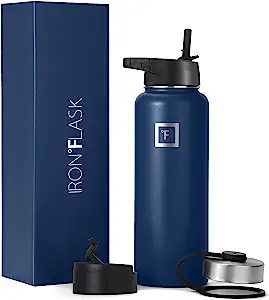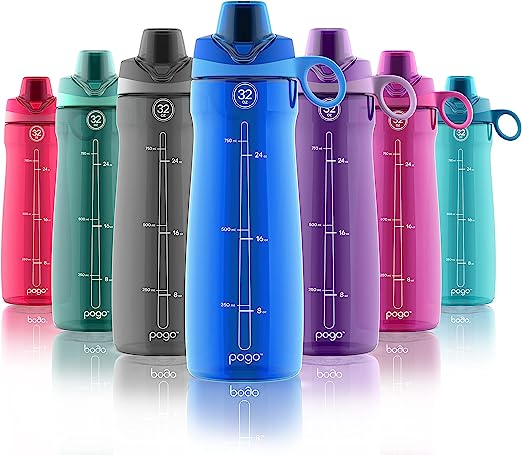Introduction
Water is essential for our overall well-being, playing a vital role in numerous bodily functions. Staying adequately hydrated is crucial for maintaining optimal health and promoting proper bodily functions. In this article, we will explore the recommended water intake, factors affecting our water needs, the benefits of meeting these goals, signs of dehydration, tips for staying hydrated, debunking common misconceptions, and address some frequently asked questions.
The Importance of Water
Water constitutes a significant portion of our body weight and is involved in essential processes like digestion, circulation, temperature regulation, and nutrient absorption. It acts as a lubricant for our joints, helps transport nutrients and oxygen to cells, and removes waste products from the body. Without sufficient water, our bodily functions can be compromised, leading to dehydration and various health issues.

IRON °FLASK Sports Water Bottle – 40oz, 3 Lids (Straw Lid), Leak Proof – Stainless Steel Gym & Sport Bottles for Men, Women & Kids – Double Walled, Insulated Thermos, Metal Canteen
Factors Affecting Water Needs
Several factors influence an individual’s water needs, including age, sex, body weight, activity level, climate, and overall health. Engaging in physical activities, residing in hot or humid environments, or experiencing certain medical conditions can increase the amount of water required to maintain hydration. It’s essential to consider these factors when determining your recommended water intake.
Understanding the Recommended Water Intake
The recommended water intake varies depending on individual factors. As a general guideline, experts suggest consuming around eight glasses of water per day, which is approximately 2 liters or half a gallon. However, this is a rough estimate, and individual needs may vary. It’s crucial to listen to your body’s signals and increase your intake if necessary.
Benefits of Meeting Your Water Intake Goals
Meeting your recommended water intake goals can have numerous benefits for your overall health. Adequate hydration helps maintain healthy skin, supports kidney function, aids digestion, prevents constipation, boosts energy levels, and promotes cognitive function. It also assists in weight management by reducing hunger and calorie intake. By prioritizing hydration, you can optimize your physical and mental well-being.

Pogo BPA-Free Tritan Plastic Water Bottle with Chug Lid, 18 Oz, Blue
Signs of Dehydration
Dehydration occurs when the body loses more fluid than it takes in. Recognizing the signs of dehydration is crucial for prompt intervention. Common symptoms include increased thirst, dry mouth, fatigue, dizziness, dark-colored urine, infrequent urination, and dry skin. If you experience any of these symptoms, it’s important to increase your water intake and seek medical attention if the symptoms persist.
Tips for Staying Hydrated Throughout the Day
Maintaining adequate hydration throughout the day is essential. Here are some practical tips to help you stay hydrated:
- Carry a reusable water bottle with you and sip water regularly.
- Set reminders or use smartphone apps to track your water intake.
- Opt for hydrating foods like fruits and vegetables.
- Limit the consumption of sugary and caffeinated beverages.
- Drink water before, during, and after physical activity.
- Spice up your water by adding slices of fruits or herbs for flavor.
- Consider the color of your urine as an indicator of hydration level.
Remember, staying hydrated is not limited to drinking water alone. Consuming hydrating foods, such as cucumbers, watermelon, and lettuce, can also contribute to your overall water intake.
Myth Buster: Debunking Common Water Intake Misconceptions
There are several misconceptions surrounding water intake. Let’s debunk some of the most common ones:
- Myth: You must drink eight glasses of water per day. Reality: Water needs vary among individuals.
- Myth: Caffeinated beverages dehydrate the body. Reality: While caffeine has a mild diuretic effect, moderate consumption is not dehydrating.
- Myth: Thirst is not a reliable indicator of dehydration. Reality: Thirst is a reliable signal that your body needs water.
- Myth: You only need to drink water when you feel thirsty. Reality: It’s important to drink water regularly to prevent dehydration.
Understanding these misconceptions can help you make informed decisions about your water intake and overall hydration.

Owala FreeSip Insulated Stainless Steel Water Bottle with Straw for Sports and Travel, BPA-Free, 24-oz, Shy Marshmallow
Frequently Asked Questions (FAQs)
Q: Is it possible to drink too much water?
A: Yes, excessive water intake can lead to a condition called hyponatremia, where the body’s electrolyte balance is disrupted. It’s important to drink water in moderation and listen to your body’s signals.
Q: Can I count beverages other than water towards my daily intake?
A: While water is the best choice, other beverages like herbal tea and diluted fruit juices can contribute to your overall water intake. However, be mindful of added sugars and calories in these drinks.
Q: How can I stay hydrated during exercise?
A: Hydrating before, during, and after exercise is essential. Drink water or sports drinks designed for hydration during prolonged or intense workouts. Listen to your body and replenish fluids accordingly.
Q: Does water intake affect weight loss?
A: Drinking water can support weight loss efforts by increasing satiety, reducing calorie intake, and boosting metabolism. However, water alone is not a magical weight loss solution.
Q: Can I rely on thirst as a signal for hydration?
A: While thirst is an indicator, it’s better to proactively drink water throughout the day, even if you don’t feel thirsty. This ensures you stay adequately hydrated.
Conclusion
Meeting your recommended water intake is crucial for maintaining optimal health and well-being. Water plays a vital role in numerous bodily functions and supports various physiological processes. By understanding your individual needs, staying mindful of hydration throughout the day, and debunking common misconceptions, you can ensure you stay adequately hydrated. Prioritize your water intake, listen to your body’s signals, and enjoy the benefits of optimal hydration.

